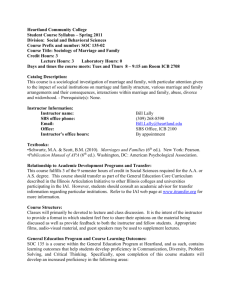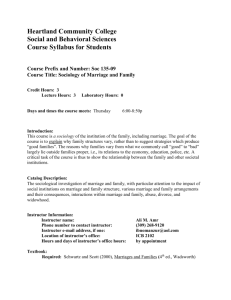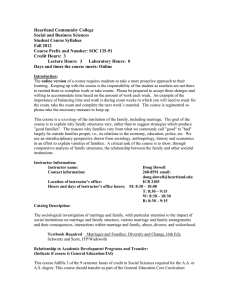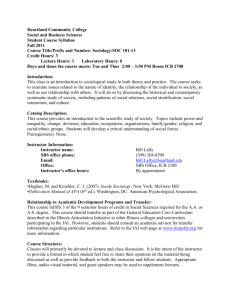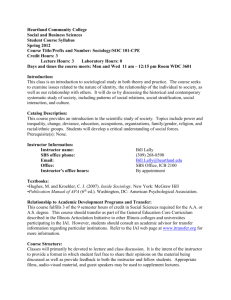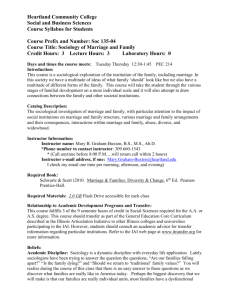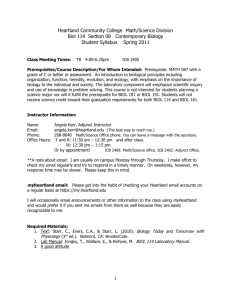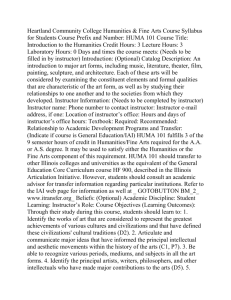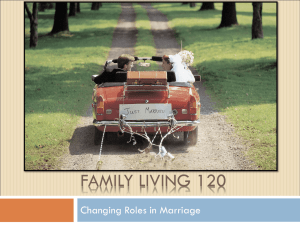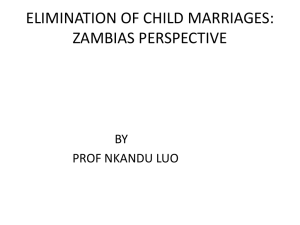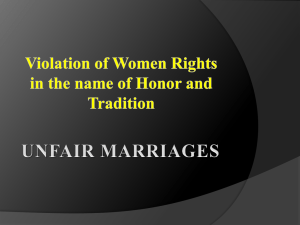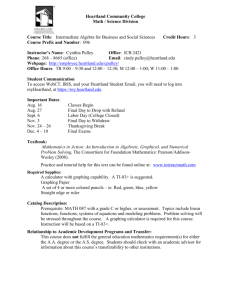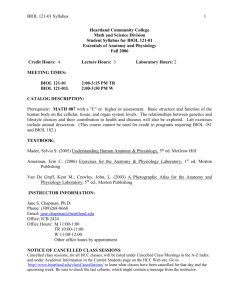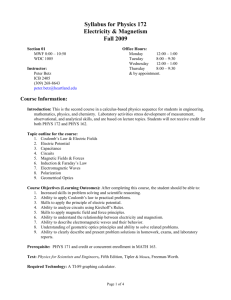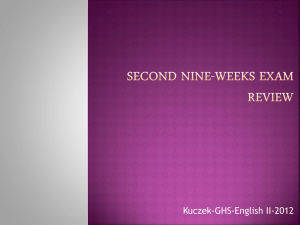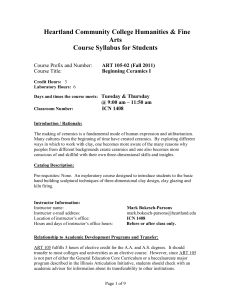SOC 135 01 LALLY FA 11 - Heartland Community College
advertisement
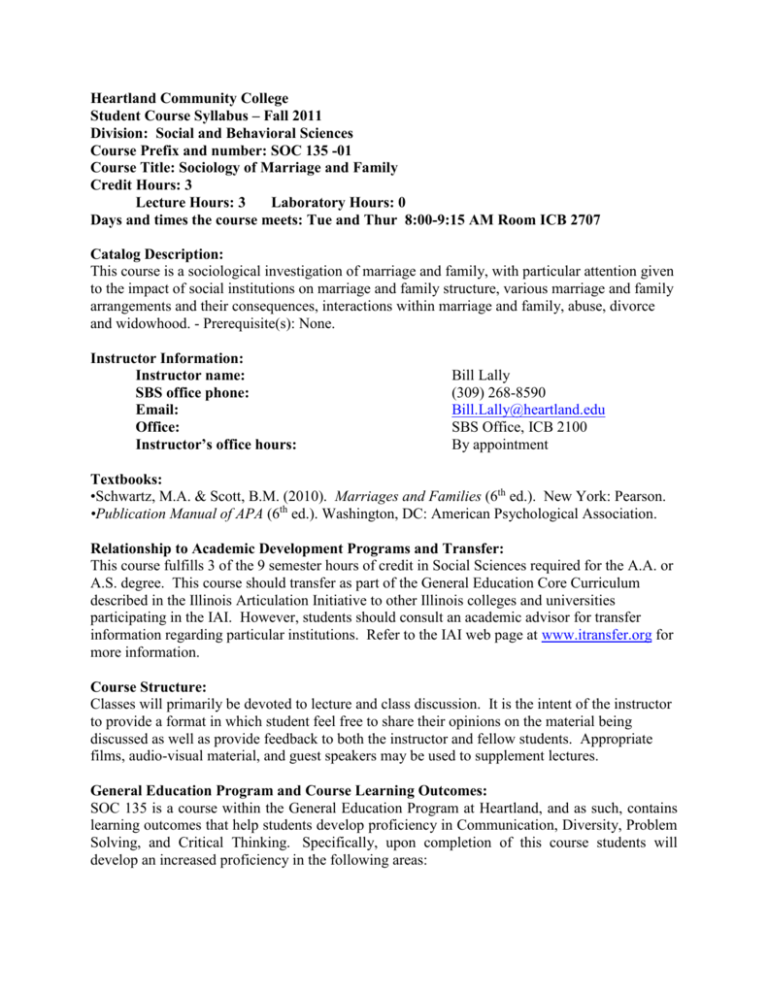
Heartland Community College Student Course Syllabus – Fall 2011 Division: Social and Behavioral Sciences Course Prefix and number: SOC 135 -01 Course Title: Sociology of Marriage and Family Credit Hours: 3 Lecture Hours: 3 Laboratory Hours: 0 Days and times the course meets: Tue and Thur 8:00-9:15 AM Room ICB 2707 Catalog Description: This course is a sociological investigation of marriage and family, with particular attention given to the impact of social institutions on marriage and family structure, various marriage and family arrangements and their consequences, interactions within marriage and family, abuse, divorce and widowhood. - Prerequisite(s): None. Instructor Information: Instructor name: SBS office phone: Email: Office: Instructor’s office hours: Bill Lally (309) 268-8590 Bill.Lally@heartland.edu SBS Office, ICB 2100 By appointment Textbooks: •Schwartz, M.A. & Scott, B.M. (2010). Marriages and Families (6th ed.). New York: Pearson. •Publication Manual of APA (6th ed.). Washington, DC: American Psychological Association. Relationship to Academic Development Programs and Transfer: This course fulfills 3 of the 9 semester hours of credit in Social Sciences required for the A.A. or A.S. degree. This course should transfer as part of the General Education Core Curriculum described in the Illinois Articulation Initiative to other Illinois colleges and universities participating in the IAI. However, students should consult an academic advisor for transfer information regarding particular institutions. Refer to the IAI web page at www.itransfer.org for more information. Course Structure: Classes will primarily be devoted to lecture and class discussion. It is the intent of the instructor to provide a format in which student feel free to share their opinions on the material being discussed as well as provide feedback to both the instructor and fellow students. Appropriate films, audio-visual material, and guest speakers may be used to supplement lectures. General Education Program and Course Learning Outcomes: SOC 135 is a course within the General Education Program at Heartland, and as such, contains learning outcomes that help students develop proficiency in Communication, Diversity, Problem Solving, and Critical Thinking. Specifically, upon completion of this course students will develop an increased proficiency in the following areas: Communication: 1. Utilize sociological theories to help understand and explain family relationships. Diversity: 1. Identify differences within family systems that are due to historical era, diversity (cultural, racial, sexual) and changing gender roles. Problem Solving: 1. Identify and analyze family issues using appropriate methods and sources in order to gain an understanding of the cause, influence, and outcome of said issue. Critical Thinking: 1. Identify and appraise the various issues that are problematic for marriage and family situations. Course Specific Outcomes: 1. Demonstrate an understanding of the connection between family upbringing and influences outside the family unit, and how these affect one’s sense of self. 2. Describe how marriage and family values are communicated and taught to new members of society via socialization, social institutions, mass media, and culture. 3. Identify significant processes included in family life cycles. 4. Analyze the multitude of relationships that exist in various family structures or forms. 5. Explain the various ways in which family structures form, and are influenced by personal experiences and social events. COURSE/LAB OUTLINE: 1. Marriage and family over time 2. Ways of studying and explaining marriages and families 3. Understanding gender 4. Love 5. Dating, coupling & mate selection 6. Sexuality and intimate relationships 7. Nonmarital lifestyles 8. The marriage experience 9. Reproduction and parenting 10. Work and the family 11. Power, abuse, and violence 12. Divorce 13. Remarriage and remarried families 14. Trends and the future Blackboard Current grades, class announcements, writing examples and assignments, as well as other support material are available for this class on Blackboard. Method of Evaluation (Tests/Exams, Grading Systems): Students should have assigned readings completed before corresponding lectures. EXAMS - There will be three exams given covering readings, lectures and other related course materials presented during that corresponding period. In other words, they are not cumulative. QUIZZES - Periodic quizzes will be administered covering that weeks assigned readings. WRITING ASSIGNMENT - There will be one writing assignment (other than your term paper) due during the semester. It will be approximately 4-5 pages long. TERM PAPER - A 6-7 page paper covering a sociologically related topic will be due at the end of the semester. A more detailed handout explaining the assignment requirements will be passed out. NOTE: Make-ups will not be given for missed exams or quizzes. However, the lowest quiz grade will be dropped. In addition, papers are due at the beginning of class. Late assignments will be penalized and will only be accepted if the student has spoken with the instructor before the due date. E-mailed papers will not be accepted. Percentage 90 - 100 80 - 89 70 - 79 60 - 69 59 or less Letter Grade A B C D F CATEGORY Quizzes Exam 1 Exam 2 Exam 3 Writing Assignment Term Paper PERCENT 10% 15% 15% 15% 20% 25% TOTAL 100% Classroom Attendance: Attendance is strongly encouraged. To promote attendance pop quizzes will be given throughout the semester. NOTE: I do not email PowerPoints. If you miss a class it is your responsibility to get the notes from a fellow student. Classroom Behavior: All cell phones should be either turned off or placed on vibrate during class. Please direct all discussion towards classroom participation. Disruptive students may be removed from class. Academic Integrity and Plagiarism: Academic Integrity Academic integrity is a fundamental principal of collegial life at Heartland Community College and is essential to the credibility of the College’s educational programs. Moreover, because grading may be competitive, students who misrepresent their academic work violate the right of their fellow students. The College, therefore, views any act of academic dishonesty as a serious offense requiring disciplinary measures, including course failure, suspension, and even expulsion from the College. In addition, an act of academic dishonesty may have unforeseen effects far beyond any officially imposed penalties. Violations of academic integrity include, but are not limited to cheating, aiding or suborning cheating or other acts of academic dishonesty, plagiarism, misrepresentation of data, falsification of academic records or documents and unauthorized access to computerized academic or administrative records or systems. Definitions of these violations may be found in the college catalog. Plagiarism Plagiarism is the presenting of others’ ideas as if they were your own. When you write a paper, create a project, do a presentation or create anything original, it is assumed that all the work, except for that which is attributed to another author or creator, is your own. Plagiarism is considered a serious academic offense and may take the following forms: 1. Copying word-for-word from another source and not giving that source credit. 2. Paraphrasing the work of another and not giving that source credit. 3. Adopting a particularly apt phrase as your own. 4. Using an image or a copy of an image without crediting its sources. 5. Paraphrasing someone else’s line of thinking in the development of a topic as if it were your own. 6. Receiving excessive help from a friend or elsewhere, or using another project as if it were your own. Academic Support Services (Academic Support Center) www.hcc.cc.il.us/divisions/asc * Note: Students are encouraged to take advantage of the writing center in an effort to improve upon their writing skills and overall written work. Heartland Library Information The library, located in the Student Commons Building at the Raab Road campus, provides Heartland students with a full range of resources including books, online journal databases, videos, newspapers, periodicals, reserves, and interlibrary loans. Librarians are available to assist in locating information. For more information, please call the library at (309) 268-8200 or (309) 268-8292. Tutoring Center Heartland Community College offers tutoring in various forms at no cost to Heartland students at the Academic Support Center (ASC) in Normal and at the Pontiac and Lincoln Centers. Tutors are available at convenient times throughout the week. Study groups, group tutoring facilitated by a specially-trained tutor, are also available by request. For more information about services available at each location, please call the ASC in Normal at (309) 268-8231; the Pontiac Center at (815) 842-6777; the Lincoln Center (217) 735-1731. Testing Center The Testing Center provides a quiet environment for students to complete make-up exams, online exams, and exams for students with special accommodations. Students may be able to complete exams in the Testing Center if arrangements are made with their instructor. For more information, contact the Testing Center at (309) 268-8231. Notice of Cancelled Class Sessions: Cancelled class sessions for all HCC classes will be listed under Cancelled Class Meetings in the A-Z Index and under Academic Information in the Current Students page on the HCC Website. Go to http://www.heartland.edu/classCancellations/ to learn what classes have been cancelled for that day and the upcoming week. Be sure to check the last column, which might contain a message from the instructor. Syllabi disclaimer: This document is meant to be a guideline for student and class expectations. There are certain aspects that will not be amended because they are policies of this institution. However, the instructor holds the right to amend certain parts of this document at any time this semester in order to make certain that the class remains focused on its objectives and goals. Class Schedule DAY TOPIC and ASSIGNMENT CHAPTER 8/23 8/25 Course Introduction / Handout Material and Articles Marriages and Families Over Times APA Style / Discuss Article – Ch. 1 8/30 9/1 9/6 9/8 9/13 Marriages and Families Over Times Ways of Studying and Explaining Marriages and Families Ways of Studying and Explaining Marriages and Families Understanding Gender Understanding Gender 9/15 9/20 9/22 9/27 The Many Faces of Love The Many Faces of Love Dating, Coupling, and Mate Selection Dating, Coupling, and Mate Selection 9/29 EXAM 1 – Covers Readings and Lectures Ch. 1 thru 5 10/4 Sexuality and Intimate Relationships American Family Decline, 1960-1990 (Popenoe, 1993) Ch. 1 Ch. 2 Ch. 2 Ch. 3 Ch. 3 •Article – When Does Gender Trump Money? (Bittman, et al., 2003) Ch. 4 Ch. 4 Ch. 5 Ch. 5 •Movie – The Science of Sex Appeal: Human Behavior Part1 Ch. 6 •Movie – The Science of Sex Appeal: Human Behavior Part2 10/6 Sexuality and Intimate Relationships Ch. 6 •Movie – The Science of Sex Appeal: Human Behavior Part3 10/11 10/13 Living Single, Living with Others: Nonmarital Lifestyles Living Single, Living with Others: Nonmarital Lifestyles Ch. 7 Ch. 7 10/18 10/20 10/25 10/27 11/1 The Marriage Experience The Marriage Experience Reproduction and Parenting Reproduction and Parenting EXAM 2 - Covers Readings and Lectures Ch. 6 thru 9 Ch. 8 Ch. 8 Ch. 9 Ch. 9 11/3 11/8 11/10 11/15 Evolving Work and Family Structures Evolving Work and Family Structures Power, Abuse, and Violence in Intimate Relationships Power, Abuse, and Violence in Intimate Relationships Ch. 10 Ch. 10 Ch. 11 Ch. 11 11/17 11/22 11/23-11/25 11/29 12/1 The Process of Uncoupling: Divorce in the United States The Process of Uncoupling: Divorce in the United States Thanksgiving Break -No Classes Remarriage and Remarried Families Marriages and Families in the Twenty-First Century •Writing Assignment Due – Learning Sexuality •Article – Gender & Relational Distance (Lally & DeMaris, 2011) Ch. 12 Ch. 12 Ch. 13 Ch. 15 •Term Paper Due –Current State of Divorce in US 12/6 12/8 12/13 Marriages and Families in the Twenty-First Century Review for final EXAM 3 - Covers Readings and Lectures Ch. 10 thru 13, & 15 Ch. 15 8-9:50 AM
